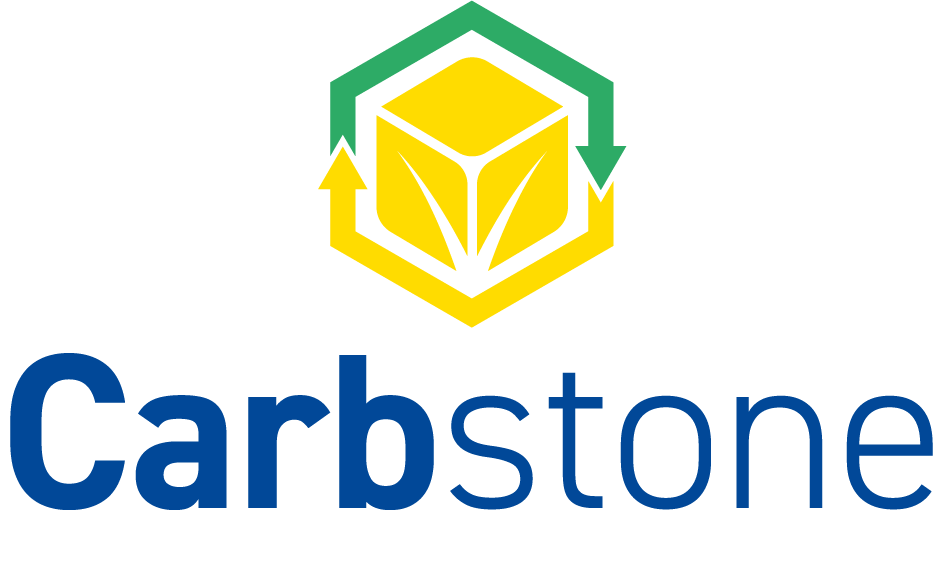Environmental Performance

Carbstone building blocks are EPD-certified!
Carbstone building blocks are EPD-certified, which means that their full environmental impact – from production to recycling – is transparently displayed. An Environmental Product Declaration (EPD) is a science-based document that identifies the ecological impact of a product throughout its life cycle. It is essential for architects and contractors to make sustainable choices and realize projects that meet the strictest environmental standards.
The EPD Life Stages: Sustainability as a foundation for the future
1. The Production Phase (A1-A3):
Shows the impact of raw material delivery, transport to production locations, and production itself.
From raw material extraction to leaving our factory: we reduce CO2 emissions by using secondary raw materials such as stainless steel slags (Carbinox), and instead of cement, we use CO2 as a binder, capturing and storing more CO2 in the stones than is emitted throughout the entire process (CCUS). This makes our stones CO2-negative. Additionally, our optimized production process is entirely powered by renewable energy sources.
2. The Construction Phase (A4-A5):
Starts when the material leaves the production site and is transported to the location where it will be used. This phase includes the impact of transportation to the construction site and on-site processing.
Carbstone ensures logistical efficiency and simple application, making project execution smoother. This includes glueable stones that significantly reduce adhesive consumption (Masterbloc Adhesive building Blocks) or prefabricated masonry walls (Masterwalls) where we deliver complete CO2-negative walls to the site in one go, cutting construction time by half.
3. The Use Phase (B1-B7):
Shows the environmental impact during the period the product is used. This stage includes emissions during use and maintenance, energy consumption from expected future repairs or replacement, and use and water consumption (if applicable).
A unique feature of Carbstone is that our blocks continue to absorb CO2 over their lifetime, contributing to their strength and a positive environmental balance. Maintenance is minimal, further enhancing sustainability.
4. The Demolition and Processing Phase (C1-C4):
Covers the impact of demolition and dismantling, transportation to the waste treatment site, and product reuse or disposal processes.
After the life of a building, our products are fully recyclable. They can be easily processed into reusable materials such as sand and gravel, preventing waste.
5. The Recycling and Reuse Phase (D):
Carbstone closes the circle. Our materials return to the construction chain without loss of quality, which is fully in line with the principles of circular construction.
Why EPD-certified is important
EPD certificates offer architects and contractors insight into the environmental impact of building materials. This helps in making responsible choices and realizing buildings with a lower carbon footprint. For the future, this means that sustainable and circular construction becomes not only feasible, but also concrete and measurable.
With Carbstone, you build both literally and figuratively a foundation for an environmentally friendly future. It is the solution for construction professionals who want to take a step forward in sustainable building processes. Make a conscious choice and build a circular, green world.
View our EPD certifications here

Carbstone is listed in the National Environmental Database.
The National Environmental Database (NMD) is an essential tool for calculating and improving the environmental performance of structures in the Netherlands. This database collects standardized information on the environmental impact of building materials during their entire life cycle. Like the EPD, the NMD provides objective, scientifically based data, but specifically tailored to Dutch legislation and construction industry.
Why is the NMD important?
For contractors, architects and construction professionals, the NMD is the tool for making sustainable choices. It enables them to select environmentally friendly materials and calculate the environmental impact of an entire construction project. This not only contributes to energy-efficient and circular buildings, but also helps in complying with regulations such as the mandatory Environmental Performance of Buildings (MPG).
Carbstone & the NMD
Carbstone is proud to be included in the NMD with a recognized MKI (Environmental Cost Indicator) value. This independently demonstrates that our blocks meet the highest sustainability standards. This allows our CO2-negative and circular products to be easily integrated into construction projects that strive to minimize environmental impact.
What does this mean for the Netherlands and Belgium?
The NMD helps the Netherlands move forward in the transition to a sustainable, circular construction sector. For Belgium, it provides an inspiring example of how environmental performance can be streamlined and transparently communicated. Together, the Netherlands and Belgium are building a greener future, in which sustainable innovations such as Carbstone play a key role.
